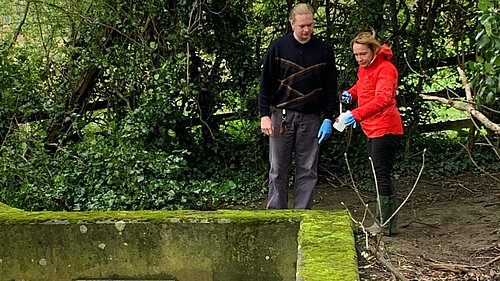Helen Morgan blasts 250 days of non-stop sewage dumping

North Shropshire MP Helen Morgan joined local councillors to test the River Morda as “shameful” statistics revealed sewage was dumped into the river for 1,655 hours last year.
Staggering data from the Environment Agency showed that Severn Trent released sewage into the Morda 146 times in 2023 for the equivalent of 69 days of non-stop release – largely from the Combined Sewage Overflow at the Sewage Treatment Works on Maesbury Road.
Severn Trent’s sewage releases increased by 77% to 440,446 hours across its network in 2023, with 5,993 hours or 250 days of sewage dumping in North Shropshire waterways alone.
Councillors in Oswestry Rural have been working to raise awareness of the problem and take action, with the Morda described as ‘nearly black’ downstream and the worst it had been for years. Councillor William Jones said: “Four months of laboratory water testing has shown consistently high levels of human waste being directly discharged into the River Morda. Recent figures confirm this, with 1,782 spills in 2023.”
In other parts of North Shropshire, sewage dumping has been even worse than at Morda. There were 1,664 hours (69 days) of overflows into the River Ceiriog, 685 hours (28 days) into the Roden, and 412 hours (17 days) into Wych Brook near Whitchurch, with a number of other smaller waterways also experiencing hundreds of hours of sewage overflows.
Meanwhile across the length of the River Severn and its tributaries, sewage was dumped for a combined 35,000 hours in 2023 alone.
Helen has previously described the scale of sewage dumping as a ‘national scandal’ and has reiterated her calls on the Government to take action, including replacing OfWat with a tougher regulator and a ban on bonuses for water company bosses whose firms have dumped sewage.
Last year Severn Trent’s Chief Executive was paid £3.2 million, with the vast majority coming in the form of bonuses, despite the company letting down residents across the Midlands.
Helen Morgan, MP for North Shropshire, said, “The scale of sewage dumping in North Shropshire and across the country is utterly shameful. Sewage was allowed to flow into waterways here for 250 days last year and that doesn’t even take into account polluting upstream that directly affects our water.
“These latest statistics are yet another chapter in an ongoing national scandal and are a damning indictment on a Government that has let people down by allowing this to continue.
“It was useful to join Oswestry Rural Parish councillors in testing the water at the banks of the Morda to see the scale of the problem for myself. It was disgusting – and who can be surprised after 68 days of non-stop sewage dumping into such a small river.
“What really appals me is that this is just one of many examples in North Shropshire, with the Ceiriog, Roden, Wych Brook, Vrwnwy, Weir Brook and Tetchill Brook all subjected to hundreds of hours of sewage dumping last year.
“We need to see real action. That means banning bonuses for sewage-dumping water company bosses, replacing Ofwat and a serious programme from Government to clean up our rivers.”
Sewage dumping in North Shropshire – by waterway
- River Ceiriog (Chirk Bank): 1,665 hours (69 days)
- River Morda (Oswestry): 1,655 hours (69 days)
- River Roden (Wem): 685 hours (29 days)
- Wych Brook (Whitchurch): 412 hours (17 days)
- River Vyrnwy (Llanymynech) : 262 hours (11 days)
- Weir Brook (West Felton and Knockin): 246 hours (10 days)
- Tetchill Brook (Ellesmere): 245 hours (10 days)
All of North Shropshire: 5,993 hours (250 days)
NB these statistics only include sewage releases that took place within North Shropshire, ie it does not include releases on the same rivers outside of North Shropshire.
